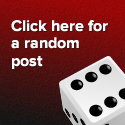There is No “Easy” Button, only a “Go” Button
I found it really fascinating. See, everyone that I’ve ever known has been short of money, myself included. Consequently, I’ve grown up alongside people who are often imagining how wonderful it would be to win the lottery, or otherwise become rich. The allure is thinking how “Once we win the lottery, we can do whatever we want!”
The creator of Born Rich is Jamie Johnson, an heir to the Johnson & Johnson fortune. What I found fascinating about Jamie is how even with his inheritance, at 21 he’s extremely confused about what to do with his life. He explains that he’s very fortunate to have the resources, and consequently the opportunity, to make a film about people that have been born into money. At the same time, the film makes clear that the rich also consider “talking about money” to be a social taboo. In spite of this, Jamie’s anxious to explore the subject with his friends and family. He’s seeing how other people feel about it, so that he can try and understand it better. In a way, he’s finding himself.
The film depicts two sides to the money spectrum. First, you have people like me, and possibly you, who need to work for it. We view money as the quick solution to all of life’s problems, and want more of it. Second, you have people like Jamie, who obtain immense wealth from their family, who never need to worry about getting more money. They give millions away to charity every year, yet still have trouble understanding what life’s all about.
A recurring theme in the film is the suggestion that “you can do anything you want, but you have to do something.” For the heirs and heiresses, there is no need to work. Still, their parents explain how “doing nothing” isn’t an option. They must do something, or risk being cut off from their inheritance. Interestingly, Jamie’s decision to “do something” turns out to be his decision to make this film.
It’s interesting to watch a discussion between Jamie and his father about their different ideas regarding what’s worth doing. Jamie mentions how he and his father were faced with the same situation when they were born: Neither of them needed to earn their own living, ever. So naturally at one point in his life, Jamie’s dad was faced with the same question we all face: What should I do with my life?
It’s not totally clear how Jamie’s father spends the bulk of his time, but this particular conversation takes place in a art studio while his father is painting a picture. With a brush and painter’s pallet in hand, Jamie’s father says “After graduation you might pursue the filming a little bit. But you might also get interested in graduate school, further studies, building a collection of historic documents, papers, publications…” Jamie asks “As a career?” and his father quickly says “Yes.”
Jamie considers his dad’s advice and meets with a historical expert. As they’re looking over an old map together, Jamie asks the expert “Well, considering I don’t have to work, what advice would you give me on…” The expert erupts in laughter, saying “Then don’t work! Then don’t work! Why would anybody in their right mind work unless they had to!?”
I relate to what the expert is saying, as he is speaking from my perspective. We imagine that if we had enough money to give us the option of never working, we could then spend our entire life doing only what we really wanted to do. Jamie, however, is speaking from a perspective I don’t fully understand, but still relate to. He’s confused in the face of unlimited possibility. He has countless opportunities for things that he can do, but he’s not sure about what he actually should do.
To me, that’s all anyone is ever looking for. You’re trying to figure out what to do with your life, but it’s not always as clear for you as it might be for everyone else.
The truth is, there is no “easy” button. According to Jamie, access to riches is worthless if you don’t know what to do with your life. Although he acknowledges that being rich is a privilege, the process of creating the documentary helps him understand the significance of the things that you make on your own. He takes pride in earning something through hard work, and even gives the impression that he’s somewhat ashamed of all the money that he’s been given.
At the end of the day, we all have our problems — and they’re all relative. I was always told that life isn’t supposed to be easy, and I’m totally on board with that suggestion. In my experiences, and judging from the documentary, there really is no “easy” button, easy route, or easy way out. There is only you, and the choices you make.
In other words, you don’t have access to an “easy” button — only a “go” button. What you make of your life is up to you. You will undoubtedly encounter hardships in life regardless of the hand you’ve been dealt, and it’s your choice to decide how you’re going to deal with them.
If you do nothing, you’ll cut yourself off from your highest potential. If you wait until you win the lottery before pursuing what you want in life, you’ll be dead before you’re given the chance to be happy.
Don’t let this happen. Press your “go” button. Run with the things that interest you, and make you happiest. It may not be easy, but there’s no telling how far your passions will take you until you go after them. So go on! Go!

Related Posts
| If you've found this website helpful, please click the PayPal button. You will be helping me pursue my dream career as a writer. Thanks for your support! |














One Response to “There is No “Easy” Button, only a “Go” Button”
What a great point. In fact, I’ve been musing about the role of adversity in our lives. It’s clear to me that I’ve only grown as a person when I’ve gone through some adversity. I think that’s true of everyone. Life wasn’t designed to be easy, it was designed to provide experiences and contrast. A racing professional once said, you win the race on the curves not the straight-aways.